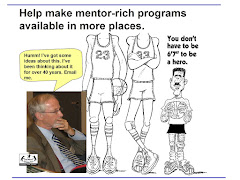This week the White House is releasing a call for mentors is a part of a series of initial recommendations being released by the My Brother’s Keeper task force. Read story here.
I've not been invited to contribute ideas to the White House plan, even though President Obama was a speaker at a May 1999 Tutor/Mentor Conference that I've hosted in Chicago every six months since 1994 as part of an on-going effort to mobilize volunteers and donors to support non-school tutor/mentor programs reaching youth in high poverty areas of Chicago and other cities.
If I had been asked to share my ideas, I would have used graphics like this to illustrate the need for a year-round campaign, with peaks as school starts in the fall, as we near the year-end holidays, in February, and in May as we near the end of the school year. These are times when extra attention can help mobilize volunteers and donors, or focus on year to year improvement of the programs hosting youth and volunteers. This PDF outlines the type of year-round strategy the White House and others could lead.
I'd also encourage the President, as Commander in Chief, and his team to integrate maps into their planning, to support the distribution of resources, volunteers and programs into all of the neighborhoods where there are high concentrations of youth needing extra support and learning opportunities. This "No General Goes to War without a Map" pdf shows ways maps can be used. This Problem Solving essay shows a planning process that would support the growth of mentor-rich programs in more places.
In addition, I'd encourage the use of graphics to illustrate a long-term commitment needed to help youth entering first grade today be entering jobs and careers in 20 to 25 years. This strategy map is a commitment many leaders could put on their web site, including the President.
I was one of ten delegates representing Chicago at the 1997 President's Summit for America's Future. That's me, standing next to the Rev. Jesse Jackson. The Tutor/Mentor Connection was one of 50 organizations from around the country invited to host Teaching Example displays at the Philadelphia Summit. My hope was that the Summit would lead to a wave of new reinforcements to support non-school tutor/mentor programs already operating in Chicago and other cities. Instead it resulted in reinventing the wheel and too few operating resources made available to support what was hoped would be a growing wave of volunteers.
The problem of violence in our inner cities is part of a larger complex problem with many causes which need to be addressed currently, and in an on-going effort sustained by many Presidents, Mayors and Governors over many years. On Thursday, May 29 I posted my review of a report focused on the achievement of Black men and boys and pointed to many sections that show the lack of consistent funding, and leadership, as well as the negative impact of fragmented efforts.
As the call goes out for volunteers, I encourage the President and others to include a call for volunteers to offer their talent to help build the infrastructure supporting volunteer involvement, at the program level, as well as at intermediary levels in cities, states and across the country.
In Chicago, if you're looking to become involved with a youth serving organization, here's my list of Chicago area programs that I've been maintaining for nearly 20 years. Some of these are very sophisticated, well organized programs. Some need lots of help. If they are in a neighborhood with kids who need help, don't wait to be asked. Look for the "contact us" button on their web site and offer your help. You can use this shoppers guide and this virtual corporate office pdf as guides for ways you might help programs grow.
I've been sharing ideas like this for nearly 20 years and have been writing this blog since 2005. I've been maintaining this web library since 1998. One of the most strategic things the President can do is to encourage the growth of learning groups in business, hospitals, colleges, faith groups, political offices, etc. so more people dig deeper into this information and build a more comprehensive vision of how extra adults can help youth from economically disadvantaged backgrounds, or who need extra help for other reasons, have a support and opportunity system that helps them grow to become productive, contributing adults.
Friday, May 30, 2014
Subscribe to:
Post Comments (Atom)
















No comments:
Post a Comment